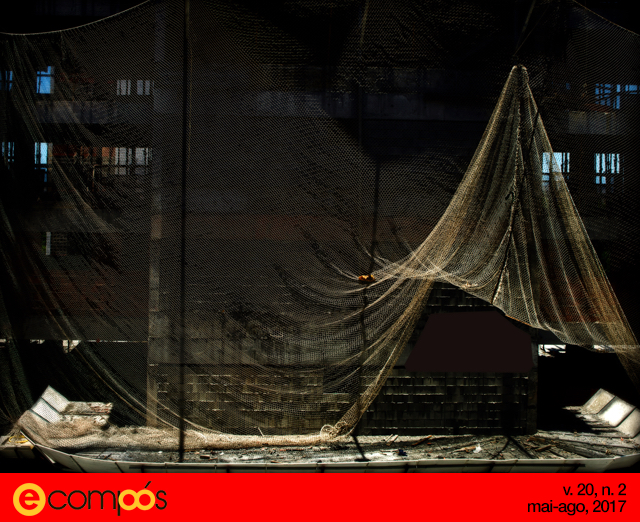Abordagem crítica da cultura da inspiração: produção de narrativas e o ideário da sociedade empreendedora
DOI :
https://doi.org/10.30962/ec.1355Mots-clés :
Comunicação e consumo. Cultura da inspiração. Cultura empreendedora. Discurso.Résumé
No contexto contemporâneo, a inspiração é um termo recorrente, quando observamos os discursos que difundem a ideologia do empreendedorismo. Em abordagem crítica, nossa pesquisa tem como objetivo analisar o papel das narrativas inspiracionais, na publicização do ideário da “sociedade empreendedora”. O objeto deste estudo inclui discursos de empreendedores e empreendedores sociais, palestras motivacionais, entre outros produtos midiáticos que assumem a missão de inspirar. O resultado desse mapeamento aponta para a cultura da inspiração como elemento chave para promover o engajamento dos sujeitos no capitalismo de nosso tempo, como discutem Boltanski e Chiapello (2009).Téléchargements
Téléchargements
Fichiers supplémentaires
- Informações omitidas para avaliação por pares (Português (Brasil))
- Figura 1 - imagem em 300 dpi (Português (Brasil))
- Figura 2 - imagem em 300 dpi (Português (Brasil))
- Figura 3 - imagem em 300 dpi (Português (Brasil))
- Figura 4 - imagem em 300 dpi (Português (Brasil))
- Figura 5 - imagem em 300 dpi (Português (Brasil))
- Figura 6 - imagem em 300 dpi (Português (Brasil))
Publié-e
Comment citer
Numéro
Rubrique
Licence
A submissão de originais para este periódico implica na transferência, pelos autores, dos direitos de publicação impressa e digital. Os direitos autorais para os artigos publicados são do autor, com direitos do periódico sobre a primeira publicação. Os autores somente poderão utilizar os mesmos resultados em outras publicações indicando claramente este periódico como o meio da publicação original. Em virtude de sermos um periódico de acesso aberto, permite-se o uso gratuito dos artigos em aplicações educacionais, científicas, não comerciais, desde que citada a fonte.
Autoria
Entende-se como autor todo aquele que tenha efetivamente participado da concepção do estudo, do desenvolvimento da parte experimental, da análise e interpretação dos dados e da redação final. Ao submeter um artigo para publicação na Revista E-Compós, o autor concorda com os seguintes termos: 1. O autor mantém os direitos sobre o artigo, mas a sua publicação na revista implica, automaticamente, a cessão integral e exclusiva dos direitos autorais para a primeira edição, sem pagamento. 2. As ideias e opiniões expressas no artigo são de exclusiva responsabilidade do autor, não refletindo, necessariamente, as opiniões da revista. 3. Após a primeira publicação, o autor tem autorização para assumir contratos adicionais, independentes da revista, para a divulgação do trabalho por outros meios (ex.: publicar em repositório institucional ou como capítulo de livro), desde que feita a citação completa da mesma autoria e da publicação original. 4. O autor de um artigo já publicado tem permissão e é estimulado a distribuir o seu trabalho on-line, sempre com as devidas citações da primeira edição.
Conflitos de interesse e ética de pesquisa
Caso a pesquisa desenvolvida ou a publicação do artigo possam gerar dúvidas quanto a potenciais conflitos de interesse, o autor deve declarar, em nota final, que não foram omitidas quaisquer ligações a órgãos de financiamento, bem como a instituições comerciais ou políticas. Do mesmo modo, deve-se mencionar a instituição à qual o autor eventualmente esteja vinculado, ou que tenha colaborado na execução do estudo, evidenciando não haver quaisquer conflitos de interesse com o resultado ora apresentado. É também necessário informar que as entrevistas e experimentações envolvendo seres humanos obedeceram aos procedimentos éticos estabelecidos para a pesquisa científica. Os nomes e endereços informados nesta revista serão usados exclusivamente para os serviços prestados por esta publicação, não sendo disponibilizados para outras finalidades ou a terceiros. Os direitos autorais pertencem exclusivamente aos autores. Os direitos de licenciamento utilizados pelo periódico consistem na licença Creative Commons Attribution 4.0 (CC BY 4.0): são permitidos o acompartilhamento (cópia e distribuição do material em qualqer meio ou formato) e adaptação (remix, transformação e criação de material a partir do conteúdo assim licenciado para quaisquer fins, inclusive comerciais.



